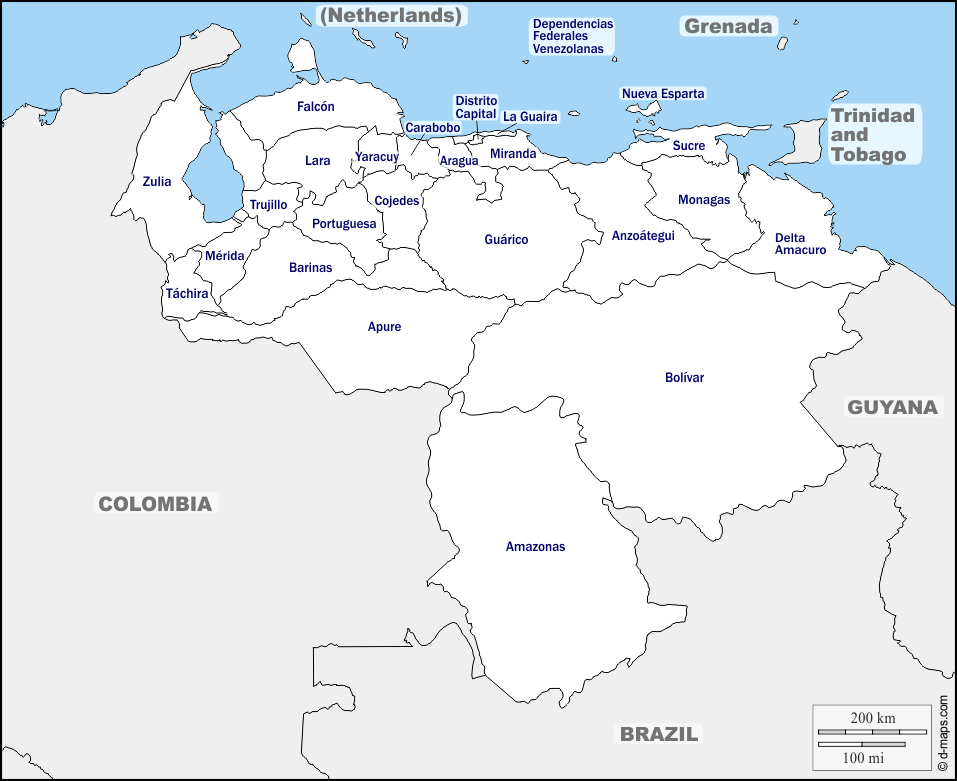Abstract
Venezuela has been pursuing decentralization since its independence in 1830. The nation has always followed an Anglo-Saxon federalist model that has been difficult to achieve over the years. Venezuela has had twenty-five Constitutions since 1811, most of which declared the country a federation. National power has always moved like a pendulum swinging between autocratic regimes to decentralized systems. From 1988 to 1998, the nation had a remarkable advance in the ratification of a federalist system. In 1999 after the election of President Hugo Chavez, the country stopped any efforts of decentralization and started a new authoritarian cycle.
Introduction
A number of countries in Latin America developed a federal system when they first became independent. The assertive political outcome seen in the United States guided these states to follow the same path for their freedom in the wake of decolonalisation (Levine, 2012). The Anglo-Saxon model of federalism offered conflict-resolution parameters while protecting integration, sovereignty, and representation of different groups. Hence, countries in Latin America have had a complex process of state-building, mixing experiments with federalism and decentralization with authoritarian rule and new democratization movements. For example, Venezuela has a long history of development and regionalization focused on maintaining its sovereignty. Inherited challenges marked citizens’ perceptions of territorial rights and autonomy. The country became a pioneer of the federalism movement in Latin America after its independence and the second country in the continent, after the United States, to implement a federal system (Brewer, 2014). Yet, 200 years after the declaration of a Federal Constitution, Venezuela is still going through a critical period, filled with economic, social, and political disputes. Federalism was introduced as a political solution that did not favor religion or cultural diversity.
The democratic system of the country had followed the movements of a pendulum for many years. This manifestation of the pendulum democracy, called the Westminster Model, goes for a combination of indirect and majoritarian democracy (Hendriks, 2010). The overthrow of the regime of Marcos Perez Jimenez and La Junta Directiva on 23 January 1958 marked the beginning of a new democratic period in the country. In Venezuelan politics, the pendulum goes back and forth from autocratic regimes to decentralized systems. The governing model applied in Venezuela shows a displacement from an independent and autonomous nation to a federal state, and from autocracy to democracy (Brewer, 2004).

Source: https://d-maps.com/carte.php?num_car=4083&lang=en
Even though it has been a difficult task, Venezuela had steadily tried to defend the idea of the Federation in its political history. The country carried out a series of changes between 1989 and 1998 to decentralize power. The first positive change was the enactment of supportive laws for the process of decentralization in 1988, such as the Law of Election and Removal of Governors of States in August 1988, and the Law on the Period of Public Powers in States in April 1989 (Rachadell, 1999). Additionally, the government enacted later in December 1989, a Decentralization Law. Before the implementation of the Decentralization Law (LODT), regions had practically no access to revenues. Generally, ninety percent of the transfers to the states were given by the National Government.
Not only the new legislation but also the desire of the regions made the change a possible new future for the country; however, the project and its adjustments ended after the nation started a fifth political cycle fuelled with autocracy. A period that began in 1998 with the election of President Hugo Chavez, and it did not stop even after he died in 2013. Now at the hands of Nicolas Maduro, the control of all branches of government continues to be centralized.
High Oil Prices and a New Centralization Era
Venezuela represented a strong economy when President Hugo Chavez Frias was in power from 1999 to 2013. The GDP per capita increased from $4,105 in 1999 to $10,810 in 2011; the unemployment rate of 14.5% in 1999 fell to 7.6% in 2011; and poverty levels went down from 23.4% in 1999 to 8.5% in 2011 (World Bank, 2012). The success in those twelve years of government had a unique element, high oil prices. National resource income were used on social aid programmes for the citizens and other nations as an exchange for favors. President Chavez gave away millions of dollars in his Popular Missions –Misiones Populares for the people of Venezuela.
The government immediately showed low interest in involving all parties and sectors of society in the political agenda of the nation. The state did not show much concern in the restoration of democracy. The country became more centralized after the approval of the Constitution of 1999. This Constitution supported the creation of the National Constituent Assembly (NCA), which became the institutional arm that President Chavez used to take over all branches of government. The NCA took all branches of the government under its responsibility and intervened in all Regional Assemblies.
Public Protests Nationwide and an Uninterested President
The country has experienced high levels of authoritarianism during the presidencies of Hugo Chavez and his successor Nicolas Maduro. They relied on scarce power-sharing among different political groups. National, State, and Municipal levels had to be managed by someone from their political party. It was important for these leaders to keep some level of power for their followers without giving away too much control. After all, authoritarian leaders know that their grip on power will be assured by buying the loyalty of people around them (Magaloni, 2008). The priority for President Chavez was to set his ideals of socialism into reality and change the future of Latin America.
As a consequence of Chavez’ aspirations, Venezuela started its fifth political cycle with his election as President of the Republic. This event sent the nation back to the autocratic side of history. When President Chavez took power in 1999, one of the first changes made was the enactment of a new Constitution. The Carta Magna per se is not entirely precise when defining the limits when the national government can interfere in local decisions. However, the integration of minorities, respect of human rights, and the federal clauses made it a more updated and inclusive document. The problem, therefore, was not the Constitution, but the unwillingness of Chavez and his successor to respect the rule of law and the limits of the Constitution.
Venezuela went into a constitutional emergency when the Supreme Tribunal took power away from the National Assembly (NA) (Supreme Tribunal of Justice Ruling Nº 155, 2017). Sustained demonstrations, protests, and riots took place in 2017, bringing President Maduro to the decision of revising the Constitution. He established a Venezuelan Constituent Assembly with members of his political supporters, aside from the legal NA of the country. As a way of defence, the NA prepared a case against the Supreme Tribunal, but it was unable to challenge these unconstitutional actions (Reuters, 2017). The president of the NA, Julio Borges, as a way of detaining these illegal actions, called for the legal activation of art. 333 and art. 350 of the Constitution and asked for the removal of President Maduro.
However internationally, confusion and misinformation prevailed (Brewer, 2014). People call Juan Guaidó a “self-proclaimed” president. The delegate Juan Guaidó, in his ability as a leader of the NA, assumed responsibility for the Presidency of the Republic in January 2019 because there was no legally elected leader for the Republic for the presidential term (2019-2025).
The re-election of Nicolas Maduro in 2018 was a political process that did not meet the national and universal guidelines of free, fair, and just elections. It was a false and illegal National Constituent Assembly introduced in 2017 which swore him in as President of the Republic and not by the National Electoral Council, the body responsible for calling political decisions. Venezuela until today remains stuck between the illegal rule of Maduro, and the push for democratic reforms coming from the supporters of Juan Guaidó – but these have become less vocal in recent months, not least due to a lack of international support for democratic reforms in the country.
A Blurred Future?
In a country where the participation of citizens is null, and the loyalty to the government is decisive, federalism will have to remain as a dream for the nation until new leadership appears. Faith in Venezuela as a Federation should remain; after all, the decentralization efforts of 1989 were a success. The lack of knowledge in how to decentralize power and the short time taken to consolidate it were the enemies of the federalist ideas that started at the end of the last century. When the country recovers its freedom to decide, federalism would be an excellent tool to solve conflicts in the territory.
In Venezuela, minorities are more excluded than ever, families divided following their political loyalties, and only conflict and despair are abundant. Federalism and decentralization promise a better democracy, good governance, and better management of diversity. It will not certainly create peace by itself, nor rebuild states after the conflict; neither will it ensure the integrity of territories or long-term stability (Anderson & Keil, 2017). However, peace could be reached because of the isolation of conflicts, allowing lower levels of government to work directly with minority groups (Bermeo, 2002). If the country wants to solve its differences and unite to progress as a nation, they need to be more flexible and adapt to new issues appearing on their path to healing their old scars.
Fernanda Ortega, M. 2021. ‘The Forgotten Federalism of Venezuela’, 50 Shades of Federalism.
References
Anderson, P. and Soeren. K. (2017). “Federalism: A Tool for Conflict Resolution?”. 50 Shades of Federalism. Retrieved from: http://50shadesoffederalism.com/category/federalism-conflict/
Bermeo, N. (2002), ‘The Import of Institutions’, Journal of Democracy, 13 (2), 96-110.
Brewer, A.R. (2004). “Centralized Federalism in Venezuela”. (pp. 481-516) Editorial Jurídica Venezolana, Caracas.
Brewer A.R., Kleinheisterkamp J. (2014) Venezuela: the End of Federalism? Federalism and Legal Unification. Comparative Perspectives on Law and Justice, vol 28. Springer, Dordrecht.
Hendriks, F. (2010). Vital Democracy: A Theory of Democracy in Action. ISBN-13: 9780199572786. Oxford May 2010 DOI: 10.1093/acprof:oso/9780199572786.001.0001
Levine, D., & Molina, J. E. (2012). Calidad de la democracia en Venezuela. América Latina Hoy, Revista de Ciencias Sociales, 62, 157–175.
Magaloni, B. (2008) Credible Power-Sharing and the Longevity of Authoritarian Rule. DOI: 10.1177/0010414007313124. Retrieved from: https://fsi-live.s3.us-west-1.amazonaws.com/s3fs-public/crediblepowersharing.pdf
Rachadell, M. (1999) Municipality system in the constituent framework, mimeo, Caracas, 22 p.
Reuters (2017). “Venezuela opposition turns ire on Supreme Court judges”. Reuters. Retrieved 3 April 2017. “Con sentencias 155 y 156, el TSJ habilita al presidente Maduro a legislar y bloquear a la AN”. Efecto Cocuyo (in Spanish).
Supreme Court of Justice of Venezuela. Judgment No. 155 of 27 March 2017, Case. No. 17-0323, Joint opinion, and No. 156 of 28 March 2017, Case. No. 17-0325.
World Bank (2012). How did Venezuela change under Hugo Chávez?. News. theguardian.com. Retrieved from: https://www.theguardian.com/news/datablog/2012/oct/04/venezuela-hugo-chavez-election-data.
Further Reading
Brewer C. (2019). Constitutional Chronicle of a Venezuela in the Darkness. Olejnik Editions, Santiago, Buenos Aires, Madrid. Pp.289-295.
Eaton, K. (2017). Territory and Ideology in Latin America: Policy Conflicts between National and Subnational Governments.
Meng, J. (2008) Impact of Governance Structure on Economic and Social Performance: A Case Study of Latin American Countries.
Milco B. (2019). The Cuban Case and the Stockholm Syndrome. ISBN: 0359851355, 9780359851355, Editor Lulu.com, pages 92.

